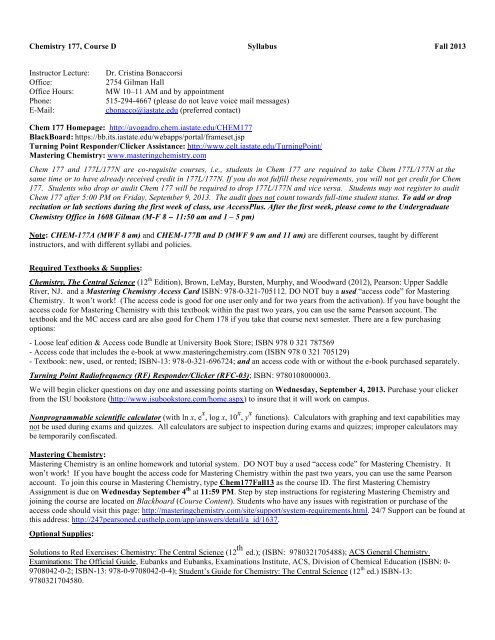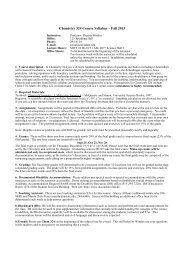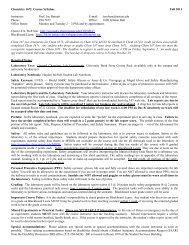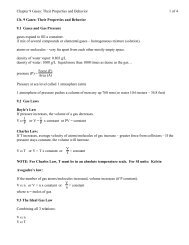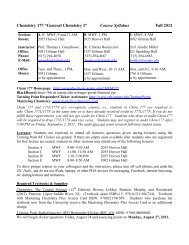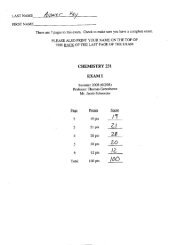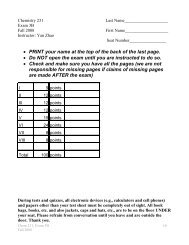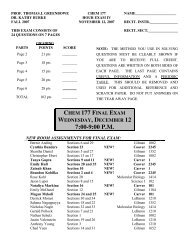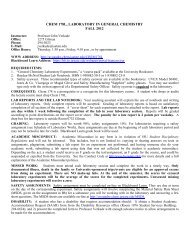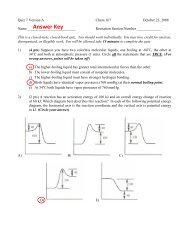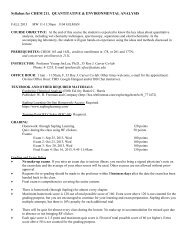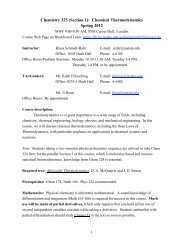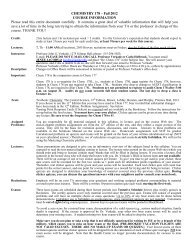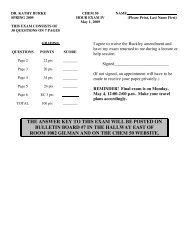Chemistry 177, Course D Syllabus Fall 2013 Instructor Lecture: Dr ...
Chemistry 177, Course D Syllabus Fall 2013 Instructor Lecture: Dr ...
Chemistry 177, Course D Syllabus Fall 2013 Instructor Lecture: Dr ...
You also want an ePaper? Increase the reach of your titles
YUMPU automatically turns print PDFs into web optimized ePapers that Google loves.
<strong>Chemistry</strong> <strong>177</strong>, <strong>Course</strong> D <strong>Syllabus</strong> <strong>Fall</strong> <strong>2013</strong><br />
<strong>Instructor</strong> <strong>Lecture</strong>:<br />
Office:<br />
Office Hours:<br />
Phone:<br />
E-Mail:<br />
<strong>Dr</strong>. Cristina Bonaccorsi<br />
2754 Gilman Hall<br />
MW 10–11 AM and by appointment<br />
515-294-4667 (please do not leave voice mail messages)<br />
cbonacco@iastate.edu (preferred contact)<br />
Chem <strong>177</strong> Homepage: http://avogadro.chem.iastate.edu/CHEM<strong>177</strong><br />
BlackBoard: https://bb.its.iastate.edu/webapps/portal/frameset.jsp<br />
Turning Point Responder/Clicker Assistance: http://www.celt.iastate.edu/TurningPoint/<br />
Mastering <strong>Chemistry</strong>: www.masteringchemistry.com<br />
Chem <strong>177</strong> and <strong>177</strong>L/<strong>177</strong>N are co-requisite courses, i.e., students in Chem <strong>177</strong> are required to take Chem <strong>177</strong>L/<strong>177</strong>N at the<br />
same time or to have already received credit in <strong>177</strong>L/<strong>177</strong>N. If you do not fulfill these requirements, you will not get credit for Chem<br />
<strong>177</strong>. Students who drop or audit Chem <strong>177</strong> will be required to drop <strong>177</strong>L/<strong>177</strong>N and vice versa. Students may not register to audit<br />
Chem <strong>177</strong> after 5:00 PM on Friday, September 9, <strong>2013</strong>. The audit does not count towards full-time student status. To add or drop<br />
recitation or lab sections during the first week of class, use AccessPlus. After the first week, please come to the Undergraduate<br />
<strong>Chemistry</strong> Office in 1608 Gilman (M-F 8 − 11:50 am and 1 – 5 pm)<br />
Note: CHEM-<strong>177</strong>A (MWF 8 am) and CHEM-<strong>177</strong>B and D (MWF 9 am and 11 am) are different courses, taught by different<br />
instructors, and with different syllabi and policies.<br />
Required Textbooks & Supplies:<br />
<strong>Chemistry</strong>, The Central Science (12 th Edition), Brown, LeMay, Bursten, Murphy, and Woodward (2012), Pearson: Upper Saddle<br />
River, NJ. and a Mastering <strong>Chemistry</strong> Access Card ISBN: 978-0-321-705112. DO NOT buy a used “access code” for Mastering<br />
<strong>Chemistry</strong>. It won’t work! (The access code is good for one user only and for two years from the activation). If you have bought the<br />
access code for Mastering <strong>Chemistry</strong> with this textbook within the past two years, you can use the same Pearson account. The<br />
textbook and the MC access card are also good for Chem 178 if you take that course next semester. There are a few purchasing<br />
options:<br />
- Loose leaf edition & Access code Bundle at University Book Store; ISBN 978 0 321 787569<br />
- Access code that includes the e-book at www.masteringchemistry.com (ISBN 978 0 321 705129)<br />
- Textbook: new, used, or rented; ISBN-13: 978-0-321-696724; and an access code with or without the e-book purchased separately.<br />
Turning Point Radiofrequency (RF) Responder/Clicker (RFC-03); ISBN: 9780108000003.<br />
We will begin clicker questions on day one and assessing points starting on Wednesday, September 4, <strong>2013</strong>. Purchase your clicker<br />
from the ISU bookstore (http://www.isubookstore.com/home.aspx) to insure that it will work on campus.<br />
Nonprogrammable scientific calculator (with ln x, e x , log x, 10 x , y x functions). Calculators with graphing and text capabilities may<br />
not be used during exams and quizzes. All calculators are subject to inspection during exams and quizzes; improper calculators may<br />
be temporarily confiscated.<br />
Mastering <strong>Chemistry</strong>:<br />
Mastering <strong>Chemistry</strong> is an online homework and tutorial system. DO NOT buy a used “access code” for Mastering <strong>Chemistry</strong>. It<br />
won’t work! If you have bought the access code for Mastering <strong>Chemistry</strong> within the past two years, you can use the same Pearson<br />
account. To join this course in Mastering <strong>Chemistry</strong>, type Chem<strong>177</strong><strong>Fall</strong>13 as the course ID. The first Mastering <strong>Chemistry</strong><br />
Assignment is due on Wednesday September 4 th at 11:59 PM. Step by step instructions for registering Mastering <strong>Chemistry</strong> and<br />
joining the course are located on Blackboard (<strong>Course</strong> Content). Students who have any issues with registration or purchase of the<br />
access code should visit this page: http://masteringchemistry.com/site/support/system-requirements.html. 24/7 Support can be found at<br />
this address: http://247pearsoned.custhelp.com/app/answers/detail/a_id/1637.<br />
Optional Supplies:<br />
Solutions to Red Exercises: <strong>Chemistry</strong>: The Central Science (12 th ed.); (ISBN: 9780321705488); ACS General <strong>Chemistry</strong><br />
Examinations: The Official Guide, Eubanks and Eubanks, Examinations Institute, ACS, Division of Chemical Education (ISBN: 0-<br />
9708042-0-2; ISBN-13: 978-0-9708042-0-4); Student’s Guide for <strong>Chemistry</strong>: The Central Science (12 th ed.) ISBN-13:<br />
9780321704580.
Recitation: Recitation/discussion sessions meet on Thursdays; attendance is required. Students are encouraged to work in groups<br />
to improve their understanding of concepts and of their problem-solving skills. A short (~12 minute) quiz will be given during<br />
every recitation session on materials covered in lecture and assigned homework. There are no make-up quizzes, no exceptions.<br />
At the end of the semester, 3 to 5 low scores will be dropped, including scores of zero due to absence.<br />
Assignments: Mastering <strong>Chemistry</strong> will be used for homework assignments. You should expect two assignments every week that<br />
will require one to two hours each. Visit http://www.masteringchemistry.com/ to keep track of due dates and your score. Mastering<br />
<strong>Chemistry</strong> is worth 75 points and these will be calculated directly out of the percentage found on the Mastering <strong>Chemistry</strong> built-in<br />
grade-book total column. If you have 100% you will be awarded 75 points, if you have 50%, you will be awarded 37.5 points, etc.<br />
Mastering <strong>Chemistry</strong> scores will be uploaded on Blackboard at mid-term and at the end of the semester. A clear explanation of how<br />
points are awarded can be found on each assignment. Some of each homework assignment may cover material that will be<br />
discussed in the upcoming lecture: this is done to encourage students to come to lecture prepared and requires reading the textbook<br />
in preparation for lectures. Many of the assignments, especially those that cover material not yet explored in lecture, are tutorial in<br />
nature; the tutorials provide hints and sufficient information to answer the questions. The tutorial problems are designed to<br />
introduce students to concepts and problem solving techniques.<br />
Late assignments will be penalized 0.5% per hour after the deadline to a maximum of 50% (submitting an assignment 24 hours<br />
late will result in a 12% penalty; submitting the assignment 2 weeks or more after the deadline will result in a 50% penalty).<br />
All Mastering <strong>Chemistry</strong> assignments must be completed by Friday, December 13 at 10 PM to count for credit. Paper-based<br />
homework may be assigned upon occasion and will be collected in recitation.<br />
Exams: In addition to the Final Exam (given during the week of Dec. 16-20), there will be three one-hour exams scheduled on<br />
the following Wednesdays: September 25, October 23, and November 20. Exams start at 1 pm and end at 1:50 pm (instead of<br />
lecture). Rooms will be communicated in class. There are no make-up exams, no exceptions. Missed exams require a face-to-face<br />
discussion with the instructor (not your TA). If a student misses two hourly exams, he/she will be asked to drop the course. Students<br />
are urged to be proactive and communicate to the instructors, in a timely manner, if anything prevents them from taking an exam.<br />
Athletes and students who are away from campus for ISU games, matches, or club trips and cannot take the exam as<br />
scheduled, must discuss their options with the instructors as soon as possible. No cell phones, PDA devices, etc. may be used during<br />
exams and in the lectures.<br />
Exams will be returned to students during the recitation session on the Thursday following each exam. The General <strong>Chemistry</strong><br />
Office will not give out individual exam scores. A Periodic table, appropriate equations, and physical constants will be provided on<br />
the back sheet of each exam.<br />
Special Academic Needs: Please address any special needs or special accommodations with the course instructor as early in the<br />
semester as possible. Those seeking accommodations based on disabilities should obtain a Student Academic Accommodation<br />
Request (SAAR) from the Disability Resources (DR) office (515-294-7220); disabilityresources@iastate.edu). DR is located in<br />
Room 1076 of the Student Services Building. Web site: http://www.dso.iastate.edu/dr/. A request presented on the day prior to the<br />
exam may not be accommodated.<br />
Academic Misconduct: Academic misconduct in any form is in violation of ISU Student Disciplinary Regulations and will not be<br />
tolerated. This includes, but is not limited to: copying or sharing answers on tests or assignments, submitting a lab report using<br />
manufactured results or results that you have not collected yourself, plagiarism, and having someone else do your academic work;<br />
having anyone other than you bring your clicker to class and use it to earn points on a quiz is academic misconduct. Depending<br />
on the act, a student could receive an F grade on the test/assignment, F grade for the course, and could be suspended or expelled<br />
from the University. See the Conduct Code at www.dso.iastate.edu/ja for more details and a full explanation of the Academic<br />
Misconduct policies.<br />
Laptops, iPods, cell phones & others: Browsing the Internet, playing games, music, movies, texting, facebook, twittering, reading<br />
newspapers, solving crosswords, etc. are not permitted in the classroom. Any disruptive behavior/activities in the class that might<br />
affect your fellow students will not be tolerated and may result in a zero grade for any assignment associated with that class<br />
including exams and may impact your grade significantly. Students disturbing class will be asked to leave the room. The use of<br />
laptops or other electronic devices is allowed only in lecture (NOT in recitation or laboratory) and only if used as a study aid (for<br />
example for taking notes). Language translators and dictionaries are not allowed during quizzes and exams, no exceptions.<br />
Grades: The grades will be based on a total possible 700 points accumulated from the 3-one-hour exams (100 points each), 100<br />
points from the 10 best recitation quizzes, 75 points from homework problems, 75 points from Turning point clicker quizzes, and<br />
the final exam (150 points). The tentative letter grade scale would be 93% A, 90% A–, 87% B+, 83% B, 80% B–, 77% C+, 73% C,<br />
70% C–, 67% D+, 63% D, 60% D–, below 60% F.<br />
Important: final grades are based solely on graded work and are NOT negotiable; no make-up or extra credit points will be offered at<br />
any time during the semester and with no exceptions. The final grade distribution will be consistent with prior semesters.
Important <strong>Course</strong> Policy: It is the student’s responsibility to check grades on Blackboard. Any student who discovers an error in a<br />
grade on Blackboard must contact the teaching assistant and bring the graded work to their TA within 1 week of receiving the returned<br />
graded work to have the grade corrected.<br />
<strong>Chemistry</strong> Help Center: The chemistry help center in room 1761 Gilman Hall is staffed by general chemistry teaching assistants.<br />
All chemistry TAs hold office hours in this room. Any student in any general chemistry course can obtain help at any time that the<br />
help center is open. Hours: Monday through Thursday 9 AM until 5 PM and Friday 9 AM to 1 PM. Solutions manuals and general<br />
chemistry textbooks, study guides, and workbooks are available. Resources in the Help Center may not be removed from the<br />
room. Students are encouraged to form study groups and meet on a regular basis.<br />
How to e-mail your Chem <strong>177</strong> <strong>Instructor</strong>s: When communicating with the Chem <strong>177</strong> <strong>Instructor</strong>s, please write in the subject area:<br />
“Chem <strong>177</strong> and what the issue is”. Be polite and business-like in your writing. Use proper sentences and correct English. Short<br />
messages are appreciated. In general, your instructors read Chem <strong>177</strong> related e-mail messages Monday–Friday. Other than<br />
emergencies, e-mail messages sent after 5:00 p.m. are not opened until 8:00 a.m.<br />
Problems and Questions: Please check on Blackboard to see if your question or issue can be answered under the Frequently Asked Questions<br />
(FAQ) section. If you are having issues with Blackboard or the electronic grade-book, contact your recitation TA. If you are having<br />
issues with Mastering <strong>Chemistry</strong>, visit:<br />
http://247pearsoned.custhelp.com/app/answers/detail/a_id/1637 (if the issue is not resolved with the mastering chemistry support, then<br />
please contact <strong>Dr</strong>. Bonaccorsi). Note that we are not able to solve technical issues such as registration, access to the internet, etc. You are<br />
however encouraged to let us know if you are unable to complete an assignment due to technical difficulties.<br />
If you have issues with your Clicker, please contact the head TA (name TBA) for the course.<br />
<strong>Course</strong> Goal/Learning Outcome: Upon successful completion of this course, students will have mastered fundamental concepts in<br />
general chemistry and will be able to successfully approach Chem 178 (the second half of our general chemistry course). Chem <strong>177</strong><br />
will allow the student to pursue upper level chemistry courses as well as specialized studies in other fields of science and engineering.<br />
Learning Objectives: In general, upon successful completion of the course, students will have refined their study skills (prepare for<br />
lecture, quizzes, and exams; study consistently and effectively; practice), will be fluent in the language of chemistry, and will have<br />
learnt to appreciate the importance of chemistry and science in their everyday life. More in detail, students will be able to:<br />
1) handle scientific data and perform calculations involving algebra and unit conversions;<br />
2) understand atomic structure and write chemical formula of compounds; know chemical symbolic representation, nomenclature, and<br />
terminology;<br />
3) understand reaction stoichiometry using balanced chemical equations and perform calculations involving moles, mass and number<br />
of molecules, limiting reactant, theoretical yield and percent yield;<br />
4) recognize different types of chemical reactions such as precipitation reaction, acid-base neutralization reaction, redox reaction and<br />
work with problems involving solution stoichiometry, molarity, and moles;<br />
5) understand energy, enthalpy of reaction, measure energy using calorimetry and Hess’s law;<br />
6) understand electronic structure and its relationship to light and other electronic properties of the matter;<br />
7) use the periodic table to explain electronic structure, properties of elements, electronegativity, electron affinity, atomic sizes and<br />
other periodic properties of elements;<br />
8) have basic understanding of chemical bonding to classify compounds as ionic and covalent and to draw Lewis structures and related<br />
resonance structures;<br />
9) understand molecular shapes, hybridization, molecular orbitals and compounds with multiple bonds;<br />
10) understand the kinetic theory of gases and the relationship between pressure, volume, temperature and amount of gases;<br />
11) understand the forces existing between molecules (intermolecular forces) and how they affect the properties of the compounds in<br />
the solid, liquid, and gas phase.
CHEM <strong>177</strong> Tentative Schedule of Classes <strong>Fall</strong> <strong>2013</strong><br />
Dates Textbook Reading Suggested Problems<br />
Aug 26, 28, 30 Ch. 1: Introduction: Matter and<br />
Measurement<br />
Ch. 1: 1, 2, 6, 7, 8, 11, 13, 17, 19, 24, 25, 28, 29, 32,<br />
35, 36, 37, 39, 40, 45, 49, 51, 55, 56, 59, 65, 71, 73,<br />
75, 77, 78<br />
Sep 2<br />
Labor Day: No <strong>Lecture</strong><br />
Sep 4, 6, 9 Ch. 2: Atoms, Molecules and Ions Ch. 2: 1, 2, 4, 5, 8, 10, 11, 12, 15, 16, 17, 19, 23, 25,<br />
29 , 31, 35, 37, 38, 43, 45, 47, 49, 51, 53, 55, 57, 59,<br />
63, 65, 66, 67, 68, 69, 70, 71, 77, 79, 83, 86, 89, 92,<br />
98, 99, 100, 103, 104, 105<br />
Sep 11, 13, 16, 18 Ch. 3: Stoichiometry Ch. 3: 1, 2, 3, 4, 5, 6, 7, 8, 11, 12, 13, 17, 18, 19, 20,<br />
21, 23, 33, 35, 37, 39, 43, 46, 49, 51, 53, 61, 63, 65,<br />
67, 69, 75, 76, 77, 81, 83, 89, 93, 94, 95, 96, 104,<br />
106, 108<br />
Sep 20, 23, 27, 30 Ch. 4: Reactions in Aqueous Solution Ch. 4: 1, 2, 5, 7, 15, 16, 17, 18, 19, 21, 23, 27, 29,<br />
35, 37, 38, 39, 40, 41, 43, 47, 49, 51, 53, 56, 61, 65,<br />
67, 68, 69, 71, 74, 75, 77, 81, 82, 83, 87, 89, 94, 96,<br />
98, 99, 103, 106, 112, 113, 114, 115<br />
Sep 25 Hour Exam I, Wednesday, 1:10 – 2:00 PM. Topics from Chapters 1-3.<br />
Oct 2, 4, 7, 9 Ch. 5: Thermochemistry Ch. 5: 4, 6, 8. 11, 15, 17, 18, 19, 21, 23, 25, 26, 27,<br />
29, 31, 33, 37, 41, 43, 45, 47, 51, 53, 55, 56, 57, 65,<br />
69, 71, 73, 80, 81, 83 1, 96, 100, 108, 114, 115, 116<br />
Oct 11, 14, 16, 18 Ch. 6: Electronic Structure of Atoms Ch. 6: 1, 2, 3, 5, 6, 8, 13, 14, 17, 19, 23, 25, 29, 31,<br />
33, 38, 39, 43, 49, 51, 53, 54, 56, 63, 65, 67, 69, 70,<br />
71, 73, 74<br />
Oct 23 Hour Exam II, Wednesday, 1:10 – 2:00 PM. Topics from Chapters 4-6.<br />
Oct 21, 25, 28, 30<br />
Nov 1<br />
Nov 1, 4, 6, 8<br />
Ch. 7: Periodic Properties of the<br />
Elements<br />
Ch. 7: 4, 7, 11, 19, 23, 25, 29, 30, 31, 33, 36, 37, 39,<br />
41, 42, 44, 45, 46, 47, 56, 57, 59, 60, 61, 62, 64, 67,<br />
68, 71, 72, 73, 74, 77, 81, 82, 88, 91, 92, 93, 97, 101,<br />
110, 112<br />
Last Day to drop a course or withdraw without extenuating circumstances<br />
Ch. 8: Basic Concepts of Chemical<br />
Bonding<br />
Ch. 8: 1, 2, 4, 9, 13, 15, 16, 17, 18, 19, 20, 21, 26,<br />
31, 32, 33, 34, 36, 37, 38, 39, 40, 41, 42, 45, 47, 48,<br />
50, 54, 56,63, 64, 65, 69, 71, 72, 74, 90, 93, 96, 97,<br />
108<br />
Nov 11, 13, 15, 18 Ch. 9: Molecular Geometry and Bonding Ch. 9: 1, 3, 4, 14, 15, 19, 21, 27, 28, 30, 31, 33, 39,<br />
43, 45, 51, 55, 56, 57, 61, 63, 66, 69, 70<br />
Nov 20 Hour Exam III, Wednesday, 1:10 – 2:00 PM. Topics from Chapters 7-9.<br />
Nov 22,<br />
Dec 2, 4, 6<br />
Ch. 10: Gases Ch. 10: 3, 4, 7, 10, 17, 23, 29, 39, 41, 45, 47, 51,<br />
53, 55, 58, 59, 61, 65, 69, 75, 77, 78, 80, 82, 83, 85,<br />
89, 97, 106, 108, 111, 116, 121, 124, 125<br />
Nov 25, 27, 29 Thanksgiving Break: No <strong>Lecture</strong>s<br />
Dec 9, 11, 13 Ch. 11: Liquids and Intermolecular Forces Ch. 11: 1, 2, 3, 5, 6, 7, 10, 11, 14, 17, 18,19, 21, 22,<br />
23, 24, 26, 27, 28, 29, 37, 40, 43, 47, 50, 51, 53, 55,<br />
57, 59, 61<br />
Dec 6<br />
Dec 13<br />
Dec 16–20<br />
Last day to request an alternative time for final exam in case of conflicts*<br />
10:00 PM deadline for completion of Mastering <strong>Chemistry</strong> assignments for credit<br />
Final Exam: A 2-hour comprehensive final exam will be scheduled as a group final sometime<br />
during the week of December 16–20. The time will be announced by the Registrar in late September<br />
or early October. Do not make travel arrangements to leave for winter break or vacation prior<br />
to the end of finals week until the date and time of final exam for Chem <strong>177</strong> is published by the<br />
ISU Registrar's Office.<br />
* Students who have three or more finals on the same calendar day may request to reschedule a final. The instructor of the course having the<br />
smallest number of students is responsible for arranging an alternate examination time for the student unless make-up exam times are available in<br />
one of the other courses. To reschedule, the student must notify the instructor prior to the last day of class before the beginning of dead week so the<br />
instructor has time to make appropriate arrangements.


